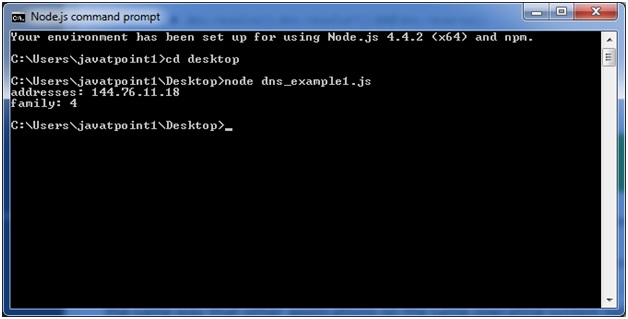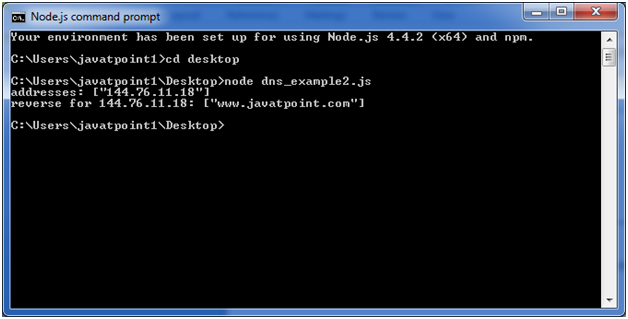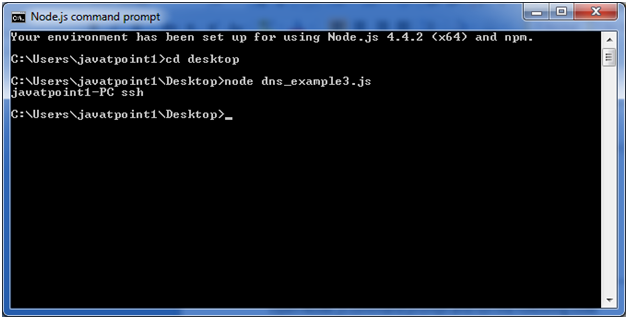Node.js Tutorial
- Node.js Tutorial
- Install Node.js on Windows
- Install Node.js on Linux/Ubuntu/CentOS
- Node.js First Example
- Node.js Console
- Node.js REPL
- Node.js Package Manager
- Node.js Command Line Options
- Node.js Global Objects
- Node.js OS
- Node.js Timer
- Node.js Errors
- Node.js DNS
- Node.js Net
- Node.js Crypto
- Node.js TLS/SSL
- Node.js Debugger
- Node.js Process
- Node.js Child Process
- Node.js Buffers
- Node.js Streams
- Node.js File System (FS)
- Node.js Path
- Node.js StringDecoder
- Node.js Query String
- Node.js ZLIB
- Node.js Assertion Testing
- Node.js V8
- Node.js Callbacks
- Node.js Events
- Node.js Punycode
- Node.js TTY
- Node.js Web Module
- NestJS
Node.js MySQL
Node.js MongoDB
Nodejs Difference
Node.js MCQ
Node.js Express
Nodejs Interview Questions
Node.js DNS
The Node.js DNS module contains methods to get information of given hostname. Let's see the list of commonly used DNS functions:
- dns.getServers()
- dns.setServers(servers)
- dns.lookup(hostname[, options], callback)
- dns.lookupService(address, port, callback)
- dns.resolve(hostname[, rrtype], callback)
- dns.resolve4(hostname, callback)
- dns.resolve6(hostname, callback)
- dns.resolveCname(hostname, callback)
- dns.resolveMx(hostname, callback)
- dns.resolveNs(hostname, callback)
- dns.resolveSoa(hostname, callback)
- dns.resolveSrv(hostname, callback)
- dns.resolvePtr(hostname, callback)
- dns.resolveTxt(hostname, callback)
- dns.reverse(ip, callback)
Node.js DNS Example 1
Let's see the example of dns.lookup() function.
File: dns_example1.js
- const dns = require('dns');
- dns.lookup('www.javatpoint.com', (err, addresses, family) => {
- console.log('addresses:', addresses);
- console.log('family:',family);
- });
Open Node.js command prompt and run the following code:
- node dns_example1.js

Node.js DNS Example 2
Let's see the example of resolve4() and reverse() functions.
File: dns_example2.js
- const dns = require('dns');
- dns.resolve4('www.javatpoint.com', (err, addresses) => {
- if (err) throw err;
- console.log(`addresses: ${JSON.stringify(addresses)}`);
- addresses.forEach((a) => {
- dns.reverse(a, (err, hostnames) => {
- if (err) {
- throw err;
- }
- console.log(`reverse for ${a}: ${JSON.stringify(hostnames)}`);
- });
- });
- });
Open Node.js command prompt and run the following code:
- node dns_example2.js

Node.js DNS Example 3
Let's take an example to print the localhost name using lookupService() function.
File: dns_example3.js
- const dns = require('dns');
- dns.lookupService('127.0.0.1', 22, (err, hostname, service) => {
- console.log(hostname, service);
- // Prints: localhost
- });
Open Node.js command prompt and run the following code:
- node dns_example3.js



